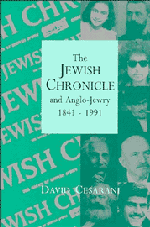Book contents
- Frontmatter
- Contents
- Preface
- Acknowledgements
- Introduction
- 1 Origins and pioneers, 1841–1855
- 2 Defining an identity: the Jewish Chronicle and mid-Victorian Anglo-Jewry, 1855–1878
- 3 The era of Asher Myers and Israel Davis, 1878–1906
- 4 The hegemony of Leopold Greenberg, 1907–1931
- 5 Discordant interlude: J. M. Rich and Mortimer Epstein, 1932–1936
- 6 Ivan Greenberg and the crisis years, 1937–1946
- 7 The post-war era: J. M. Shaftesley and David Kessler, 1946–1958
- 8 The Jewish Chronicle under William Frankel, 1958–1977
- 9 The Jewish press in a divided community: Geoffrey Paul, 1977–1990
- Conclusion
- Notes
- Bibliography
- Index
- Plate section
1 - Origins and pioneers, 1841–1855
Published online by Cambridge University Press: 22 September 2009
- Frontmatter
- Contents
- Preface
- Acknowledgements
- Introduction
- 1 Origins and pioneers, 1841–1855
- 2 Defining an identity: the Jewish Chronicle and mid-Victorian Anglo-Jewry, 1855–1878
- 3 The era of Asher Myers and Israel Davis, 1878–1906
- 4 The hegemony of Leopold Greenberg, 1907–1931
- 5 Discordant interlude: J. M. Rich and Mortimer Epstein, 1932–1936
- 6 Ivan Greenberg and the crisis years, 1937–1946
- 7 The post-war era: J. M. Shaftesley and David Kessler, 1946–1958
- 8 The Jewish Chronicle under William Frankel, 1958–1977
- 9 The Jewish press in a divided community: Geoffrey Paul, 1977–1990
- Conclusion
- Notes
- Bibliography
- Index
- Plate section
Summary
Jacob Franklin and Isaac Vallentine, 1841–1844
Two figures dominate the first years of the Jewish press in Britain, Jacob Franklin (1809–77) and Isaac Vallentine (1793–1868). Although Franklin was born and educated in England while Vallentine was from the Low Countries, both men were typical offshoots of the Jewish enlightenment and combined a deep knowledge of Judaism with a fascination for secular learning. They brought to their involvement in Jewish affairs the outlook of the educated English middle classes, blending the early nineteenth-century belief in reason and progress with the traditional values of Judaism. Their separate, and at times conflicting, ventures into publishing were the outstanding product of this fusion.
Jacob Franklin is usually regarded as the ‘father’ of the Jewish press in England, even though it was not he who founded the Jewish Chronicle. The paper launched by Franklin in September 1841 was called the Voice of Jacob, and it actually pre-empted the publication of the Jewish Chronicle by several weeks. The two journals co-existed uneasily for six months, before the Jewish Chronicle was merged with the Voice of Jacob. The latter then held a monopoly position for nearly two years, until the Jewish Chronicle was revived, and continued to appear until 1848. Franklin thus presided over the birth of the first Jewish newspaper in England to achieve more than transient success. Many years later, long after the demise of his own publication, he stepped in to save the Jewish Chronicle when it was stricken by crisis.
- Type
- Chapter
- Information
- The Jewish Chronicle and Anglo-Jewry, 1841–1991 , pp. 8 - 31Publisher: Cambridge University PressPrint publication year: 1994



